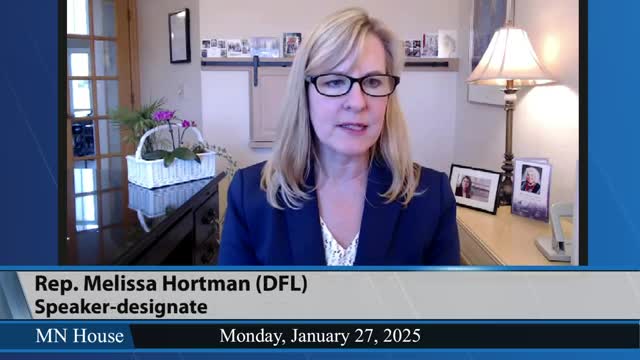Minnesota House negotiators resume talks after Supreme Court quorum ruling; removal of Rep. Brad Tabke remains a sticking point
Get AI-powered insights, summaries, and transcripts
Subscribe
Summary
House negotiators say they resumed talks after the Minnesota Supreme Court clarified a quorum is 68; talks have produced written offers but remain deadlocked over whether Republicans can expel Rep. Brad Tabke and over the structure of a power‑sharing agreement if the chamber is tied.
Representatives said Monday that negotiations to resolve control of the Minnesota House resumed after the Minnesota Supreme Court clarified that a quorum for the chamber is 68.
"We're just here to answer questions and give an update about where things are, at the Minnesota House of Representatives on Jan. 27, 2025," Representative Long said, adding that he and Representative Daymuth had returned to the negotiating table after the court ruling.
The court decision resolved a central procedural dispute that followed actions on the House floor between Jan. 14 and Jan. 24 that negotiators described as having "no legal effect." Representative Long said the ruling was important to get Republicans back to negotiations but said some issues remain difficult.
"We have made progress on some issues. Some issues are more difficult," Representative Long said, describing several days of intensive talks: "We got together on Saturday and Sunday and again this morning. And we worked several hours, on Saturday, several hours on Sunday, and I wanna say about 3 — 3 hours this morning." He also said negotiators had exchanged multiple written offers, including "about 3 pages of narrative and 9 pages in proposed agreement," and estimated "we might be up to 10 total" offers exchanged since Jan. 13.
A central sticking point is whether the House GOP will pursue removing Representative Brad Tabke, who was repeatedly identified in the briefing as the lawfully elected representative for Shakopee. Representative Long warned against expulsion efforts: "Kicking out Representative Tabke would set an incredibly dangerous undemocratic precedent," he said, noting Tabke "won on Election Day, he won in a recount, and he won in a court ruling." Long and other speakers said Democrats' proposal is to operate under a negotiated power‑sharing agreement if the chamber becomes tied at 67–67: Republican members would chair committees and run the chamber during the period before any tie, then revert to co‑chairs and equal representation if and when the tie occurs.
Reporters asked whether the GOP has the votes to remove Tabke and whether the dispute could extend until late winter. Representative Long said he had not received written assurances that Republicans would not pursue expulsion and that the Republican caucus was still "processing and determining" its position. On timing, he said he hoped for an agreement "sooner rather than later" and suggested it might be reached by the end of the week.
Questions about whether House members who are denying quorum should receive full pay drew a legal response: "Legislative pay is set by the constitution in Minnesota statute, and so that there would not be any action that could be taken that would impact pay," Representative Long said, adding that the DFL members view their absence as part of representing constituents and preserving election outcomes.
The briefing included repeated references to past dates in the dispute. Representatives said the contested actions on the House floor began Jan. 14, that an appeal period for related cases ran through Jan. 24, and that the briefing occurred Jan. 27 after the Minnesota Supreme Court ruling on quorum. Negotiators identified Secretary of State Steve Simon as having applied the constitutional quorum standard when he convened the chamber.
No formal vote or change in House organization was announced at the briefing; negotiators said talks would continue. Representative Long described the negotiations as a search for workable dispute‑resolution mechanisms for a rare tied chamber, noting that the Minnesota Senate settled similar issues by agreeing to co‑governance when tied.
For now, the status is negotiation and delay: negotiators reported progress on some points, but the questions of whether Republicans will attempt to remove Representative Tabke and the final language of any power‑sharing agreement remained unresolved.
